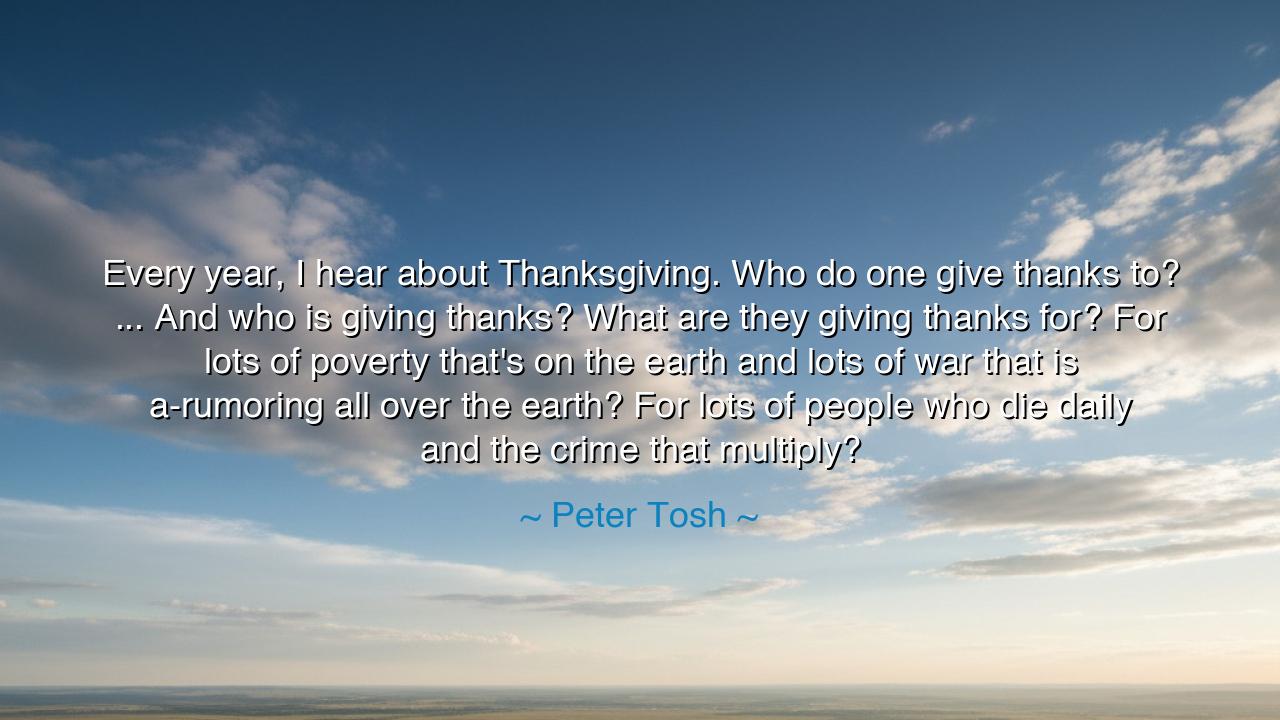
Every year, I hear about Thanksgiving. Who do one give thanks
Every year, I hear about Thanksgiving. Who do one give thanks to? ... And who is giving thanks? What are they giving thanks for? For lots of poverty that's on the earth and lots of war that is a-rumoring all over the earth? For lots of people who die daily and the crime that multiply?






Hearken, O seeker of wisdom, to the words of Peter Tosh, who raised his voice against the hollow feasts of the world. His question was no idle murmur, but a cry of the soul: “Every year, I hear about Thanksgiving. Who do one give thanks to? … And who is giving thanks? What are they giving thanks for? For lots of poverty that’s on the earth and lots of war that is a-rumoring all over the earth? For lots of people who die daily and the crime that multiply?” Behold, in this lament, he tears aside the veil of ritual and custom, and asks the eternal question: what is the meaning of gratitude if it is blind to suffering?
Long have men gathered at the table, filling their plates with plenty, while the world groans outside their doors. The feast of Thanksgiving was birthed in the soil of the New World, where Pilgrims and Native Peoples once sat together, yet its shadow is heavy with conquest, hunger, and the dispossession of the first inhabitants of the land. Tosh, the prophet of reggae and fire, was not deceived by the hymns of abundance; he looked instead to the multitudes who, on that same day, had no bread, no peace, no hope. His words echo the voices of the oppressed, reminding us that gratitude without justice is but vanity.
Consider, O children, the tale of the Cherokee people, driven from their ancestral homelands upon the Trail of Tears. As settlers feasted, entire nations walked through snow and death, their songs of mourning rising to the heavens. What then was “thanksgiving” to them? Was it not a bitter irony, that their sorrow was the soil upon which another people built their festival? In this, we see the truth of Tosh’s lament: the world’s ceremonies often forget the very lives that made them possible. Gratitude without remembrance becomes ingratitude in disguise.
Yet hear also the deeper strain of his questioning. Tosh asks not only about the feast, but about the heart of man. “Who is giving thanks?” he asks. For what? For poverty? For war? For daily death and multiplying crime? His words burn like a sword, cutting through false celebrations to expose a wounded world. How can men bow their heads in prayer when their hands are stained with neglect? How can nations speak of blessings while their streets are filled with the homeless and their skies thunder with warplanes? This is the hypocrisy that stirred his righteous anger.
But despair not, for Tosh’s voice is not only a rebuke—it is also a call to awakening. True thanksgiving is not measured by feasts, nor by words spoken once a year. True thanksgiving is lived daily, in acts of compassion, in deeds of justice, in the refusal to turn away from the suffering of the least among us. The ancients taught that the gods are honored not by sacrifices of grain and beast, but by the care we show to the widow, the orphan, and the stranger. Thus Tosh’s cry reminds us that gratitude and justice are bound together: one cannot live without the other.
Mark well the lesson, O listener. When you sit at your table, ask yourself: “Who is hungry tonight, whom I could feed?” When you enjoy the peace of your home, ask: “Who is hunted by war, whom I could defend?” When you rejoice in your blessings, let your gratitude overflow into action, lest your thanksgiving be an empty shell. Let your thanks rise not only from lips but from hands that labor for peace, for bread, for healing.
Therefore, the teaching is this: Do not give thanks for poverty, but work to end it. Do not give thanks for war, but rise against it. Do not give thanks for suffering, but ease it. Then shall your gratitude be pure, and the heavens will hear it as true praise. Remember the cry of Peter Tosh, who spoke as a prophet: Thanksgiving without justice is hollow. But thanksgiving with compassion is holy. Go forth, then, and make your daily life a song of true thanks, written not in words alone, but in the deeds of mercy and the struggle for peace.






AAdministratorAdministrator
Welcome, honored guests. Please leave a comment, we will respond soon